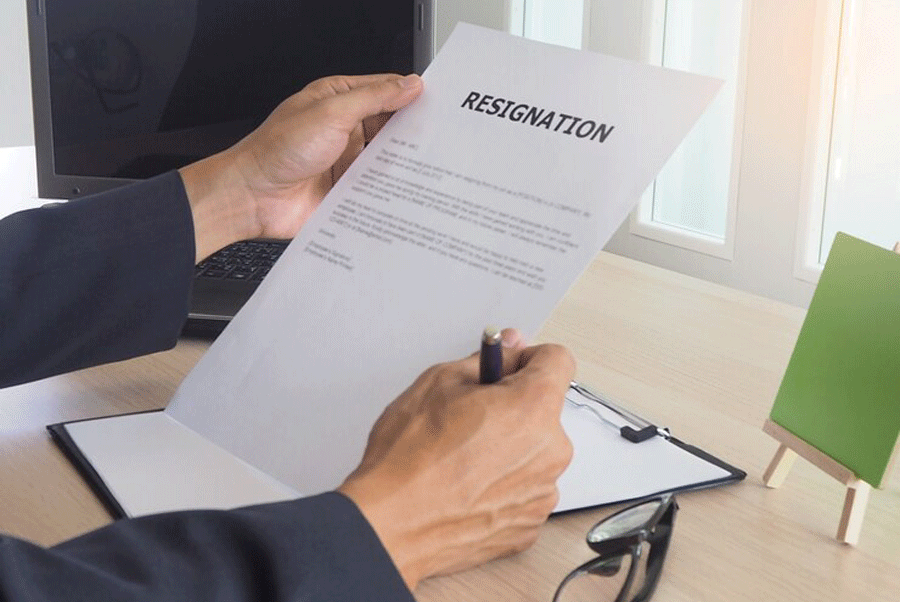In every industry and profession, including nursing, resignation is fairly common. Therefore, there may come a time when you have to resign from your position as a nurse for one reason or another. The official way of doing this is by discussing your intention with your supervisor and handing in a resignation letter to this effect.
Besides communicating your intention to resign, a letter is a courtesy and professional gesture to retain any professional networks created with your soon-to-be former employer. The importance of maintaining good relationships in a medical career cannot be stressed enough, as they are precious references.
This article will discuss how a professional letter should be formatted, its components, and its essential points.
A nurse resignation letter is an official notice or declaration of your intention to resign as a nurse from a particular medical facility.
The letter should be submitted with notice; the notice period of 6-8 weeks is typically widely accepted. This gives the management enough time to find a replacement or reassign duties to other staff members. It should be addressed to the appropriate party, usually the manager or HR.
Free Templates
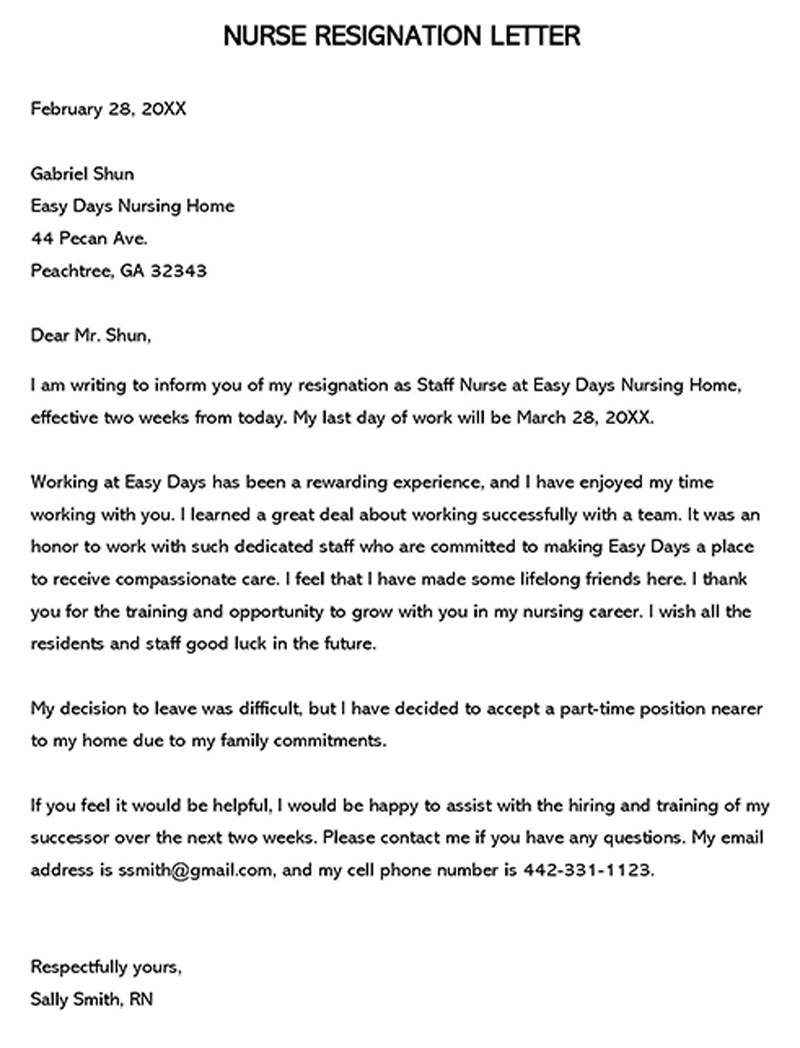
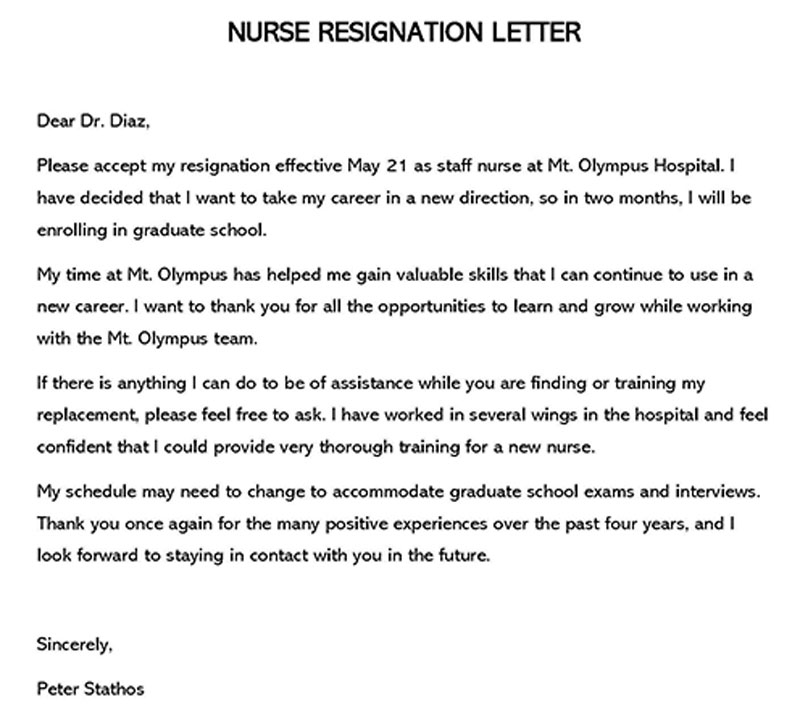
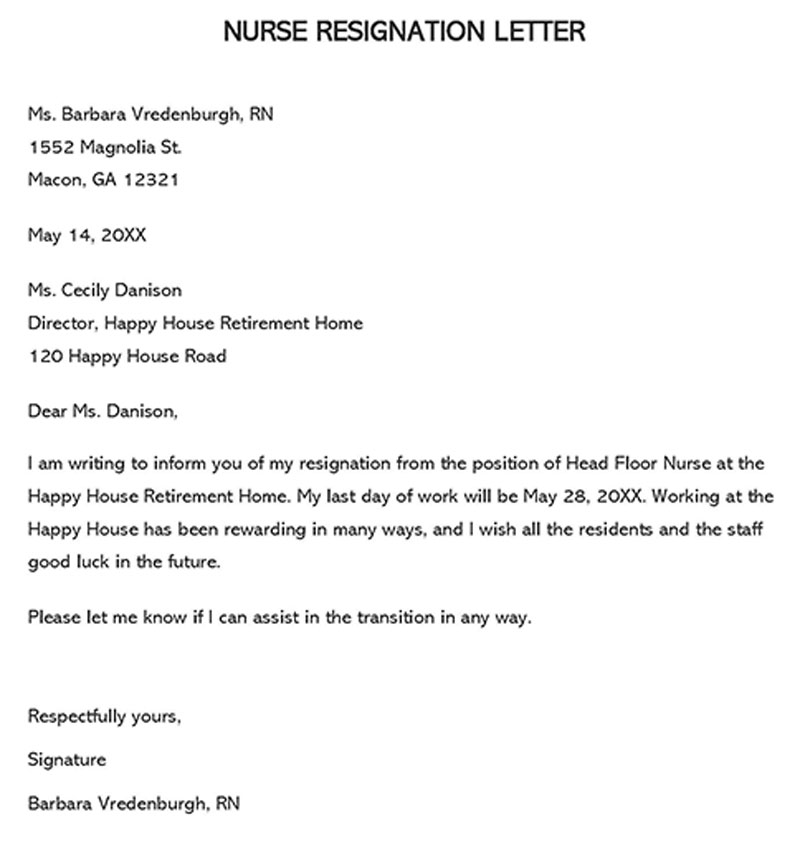
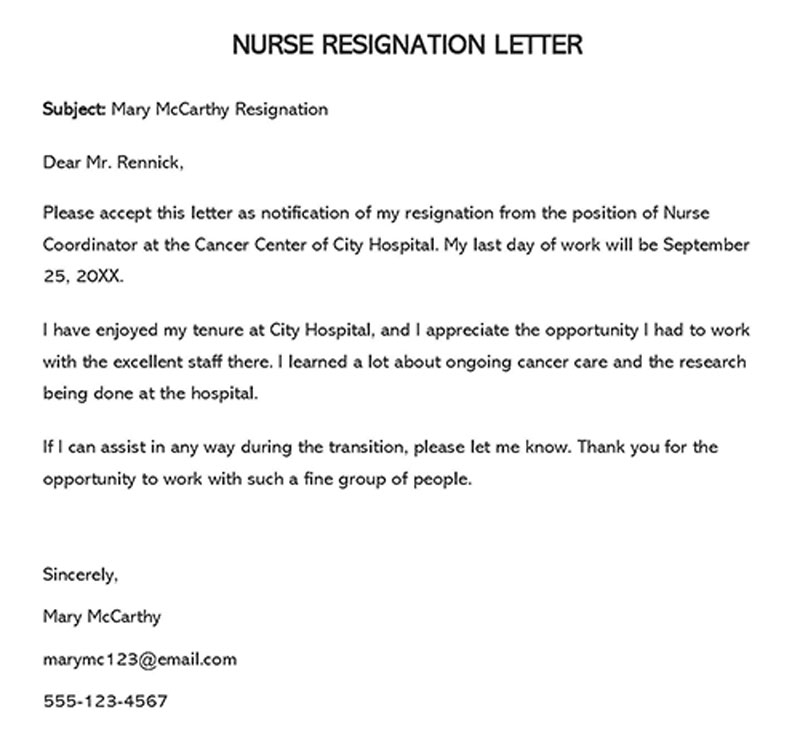
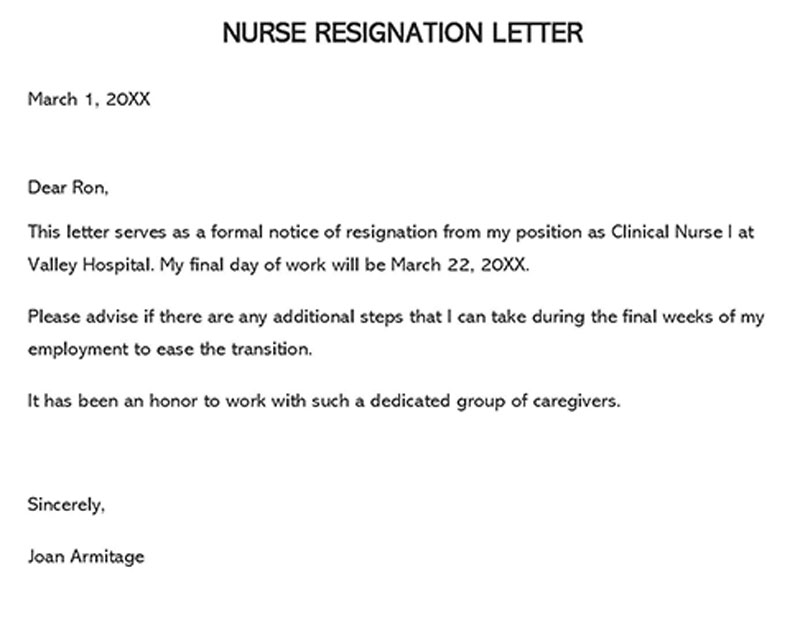
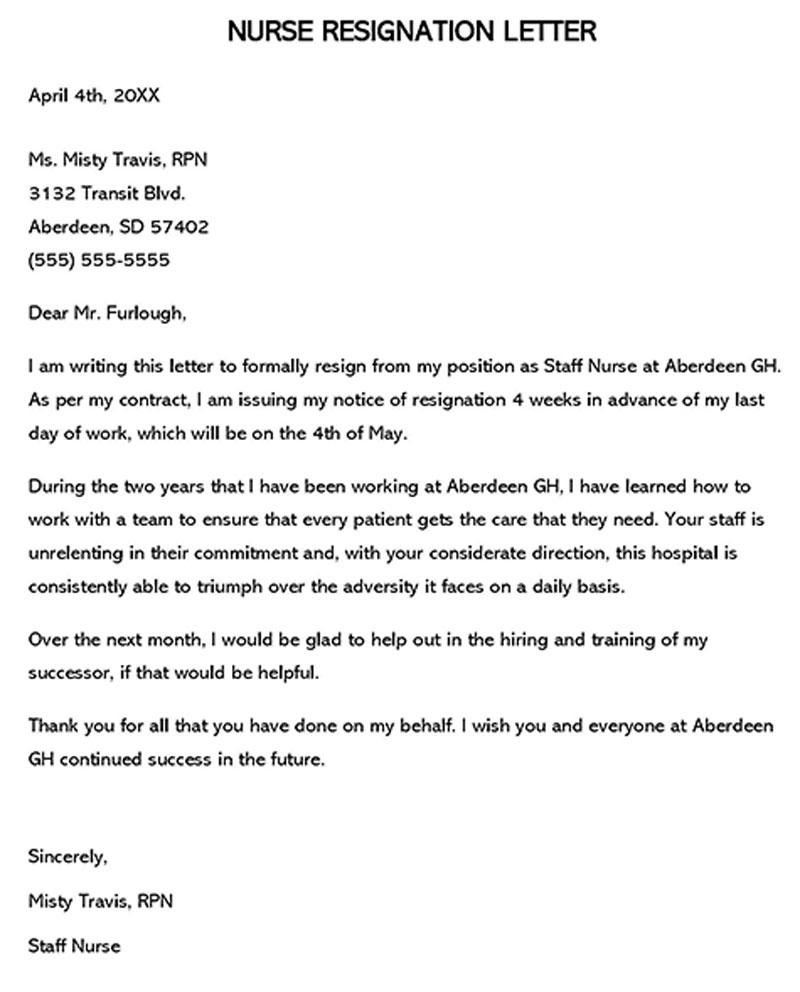
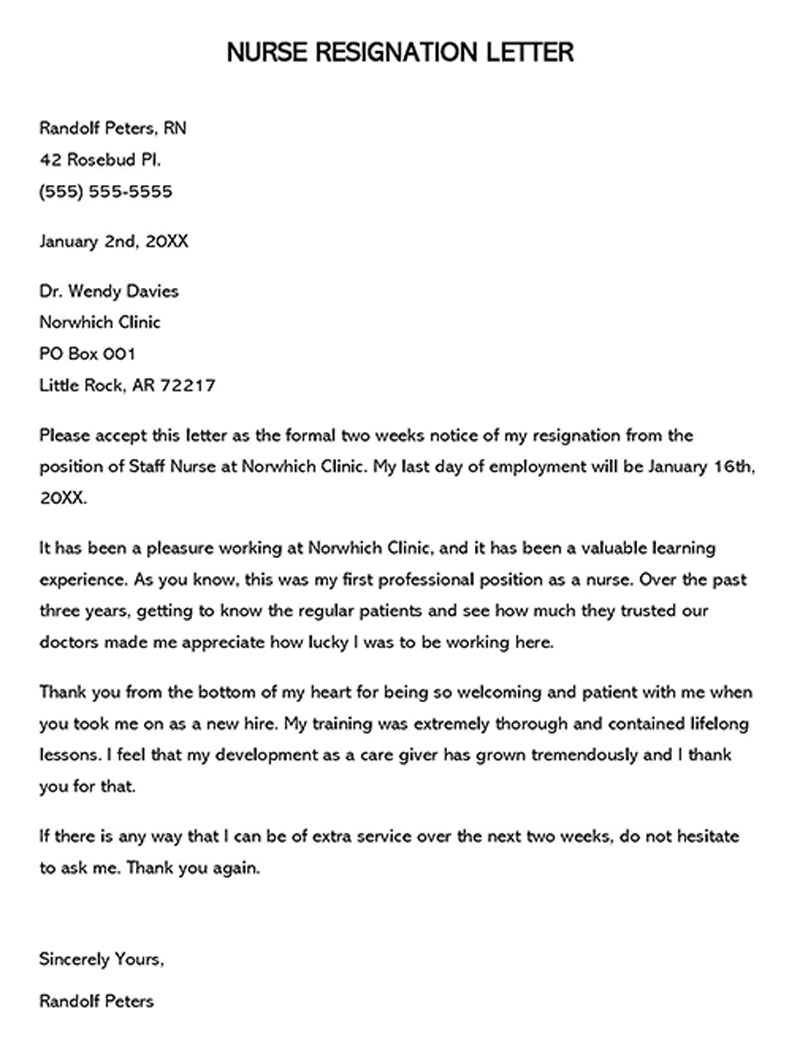
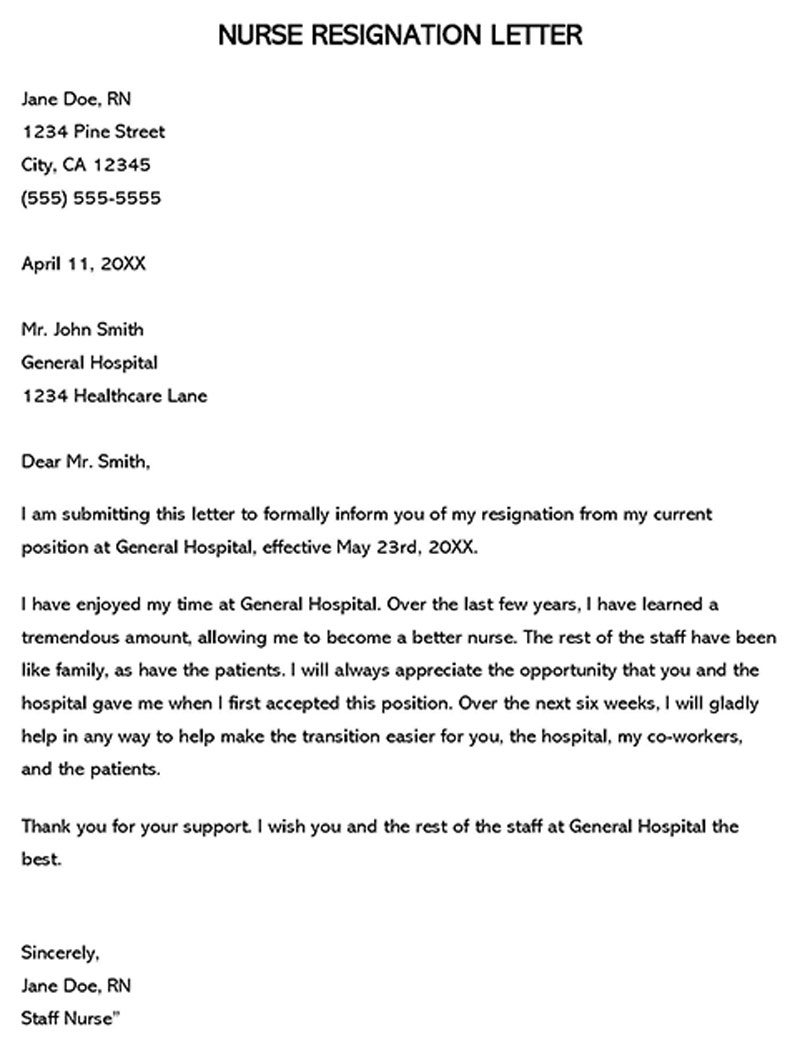
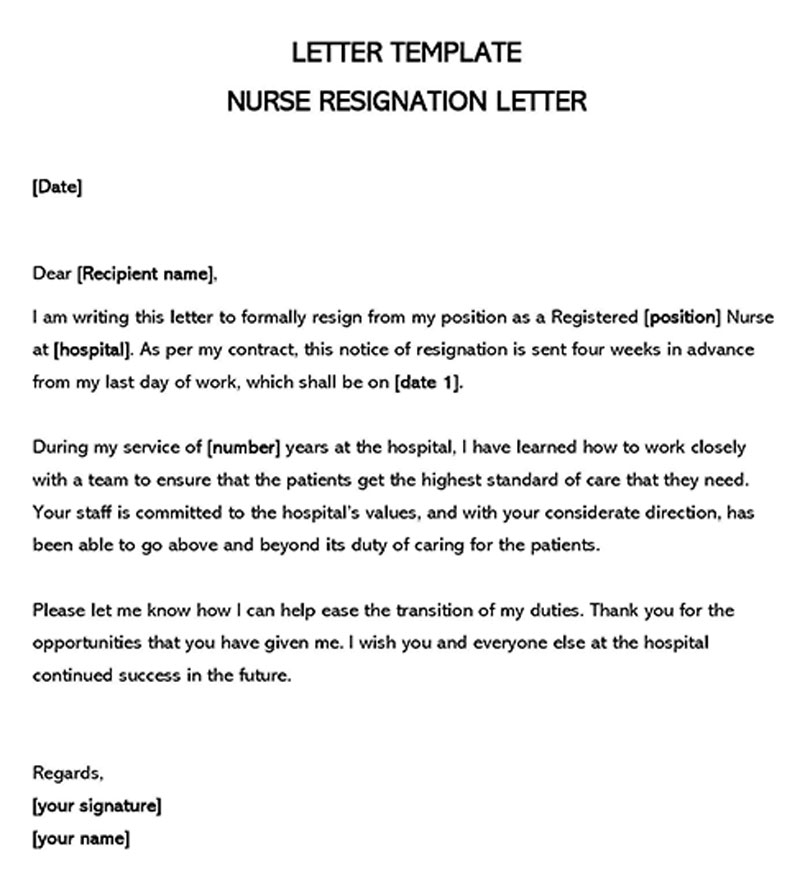
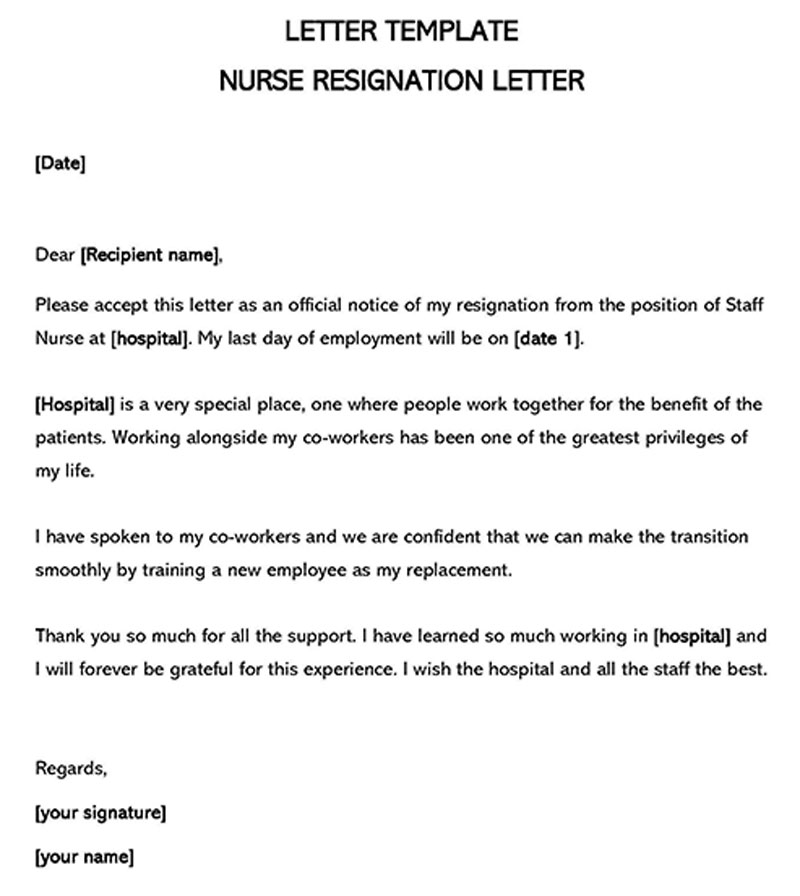
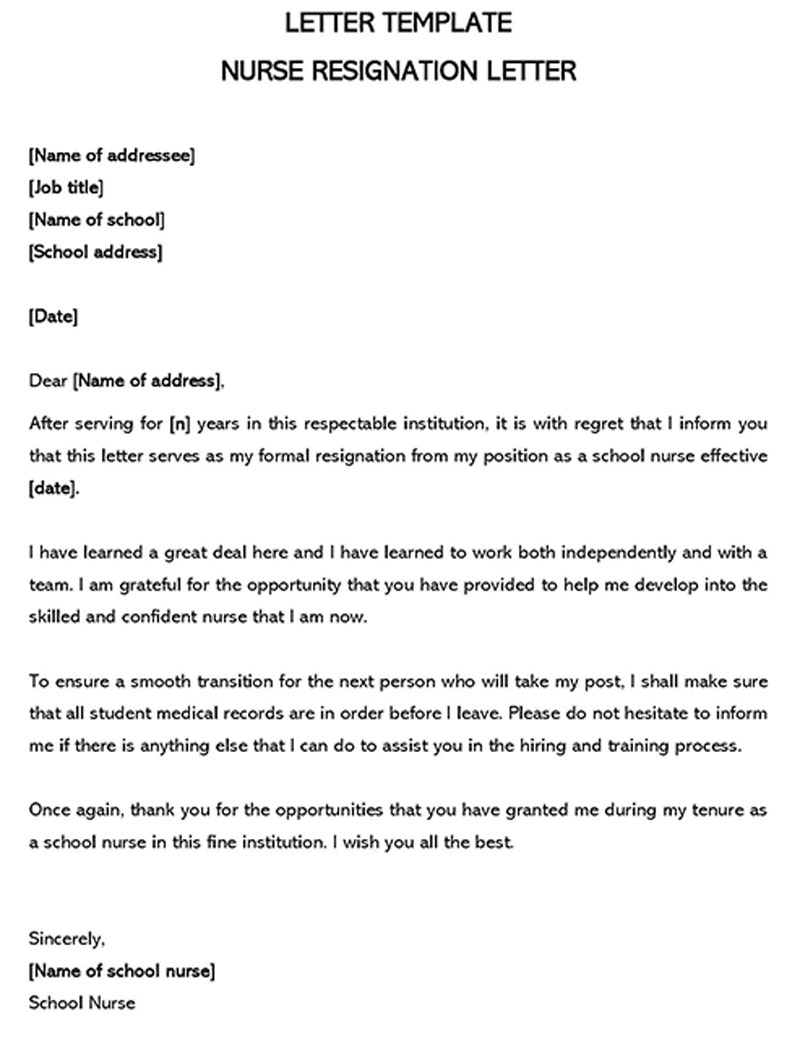
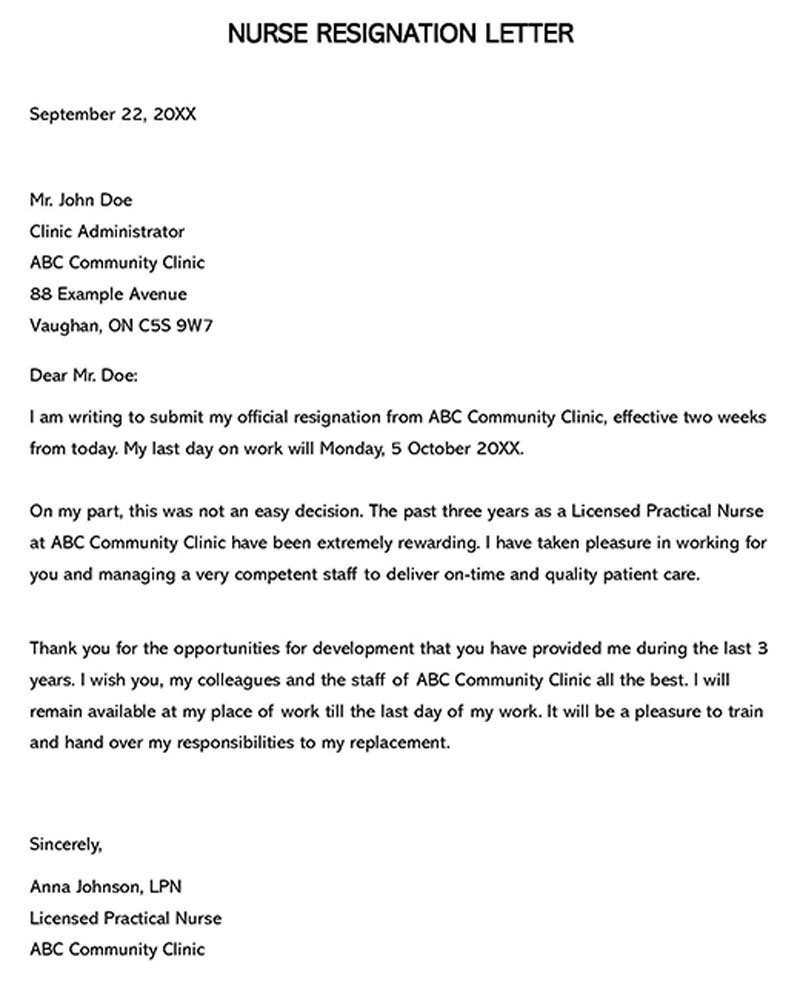
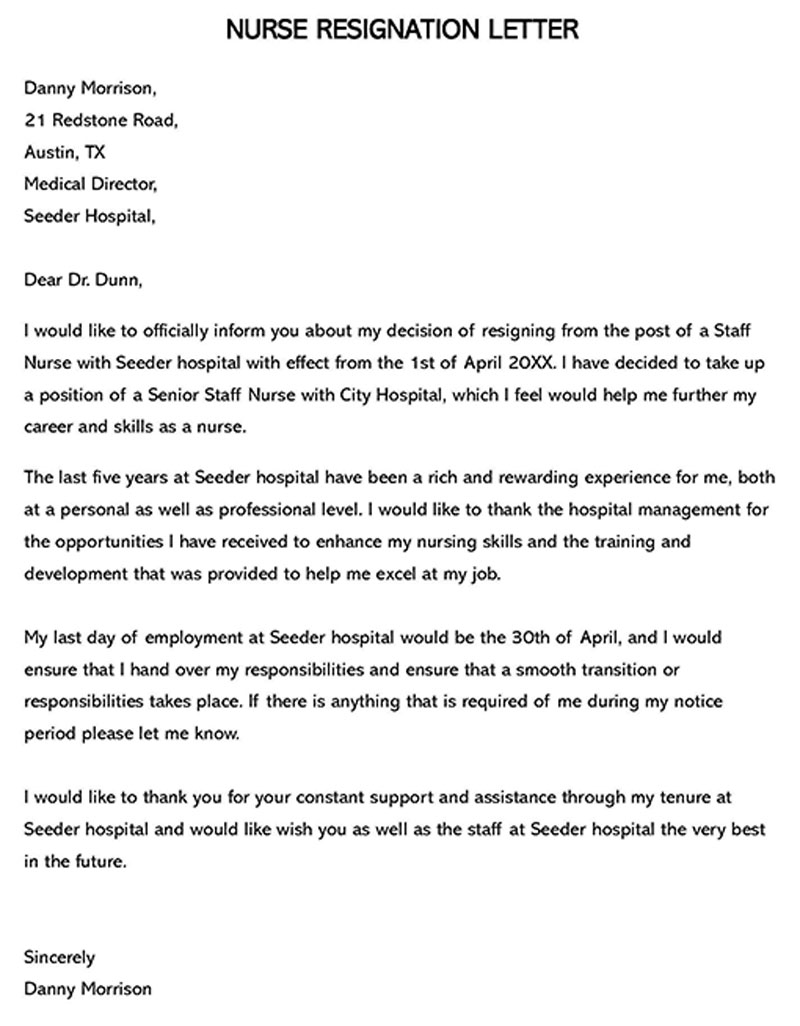
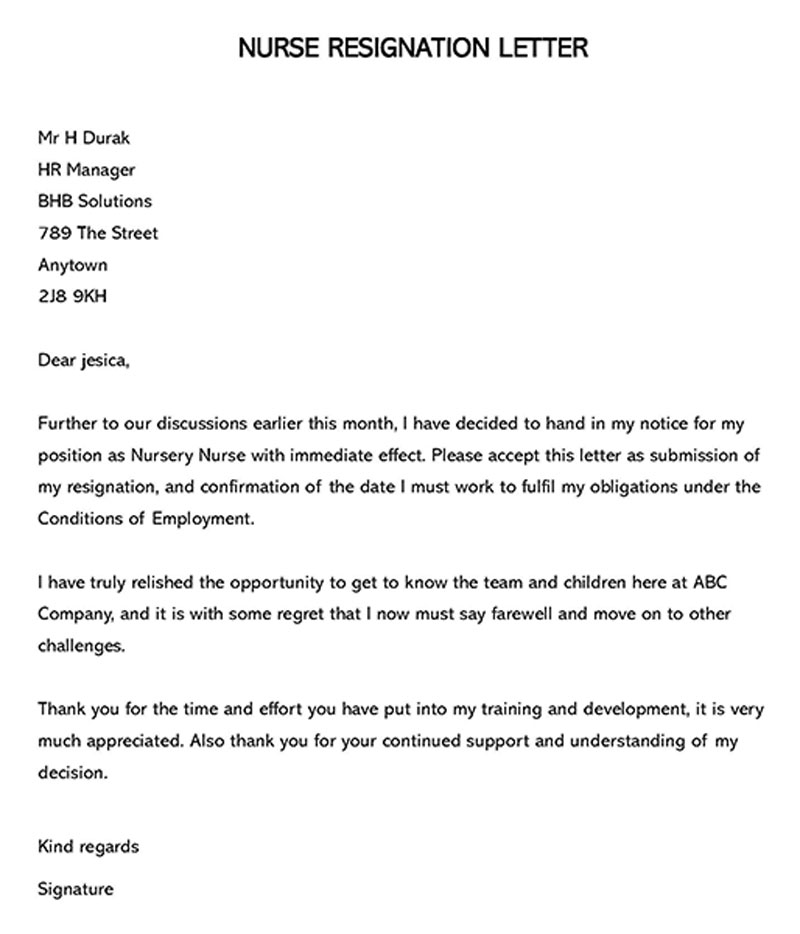
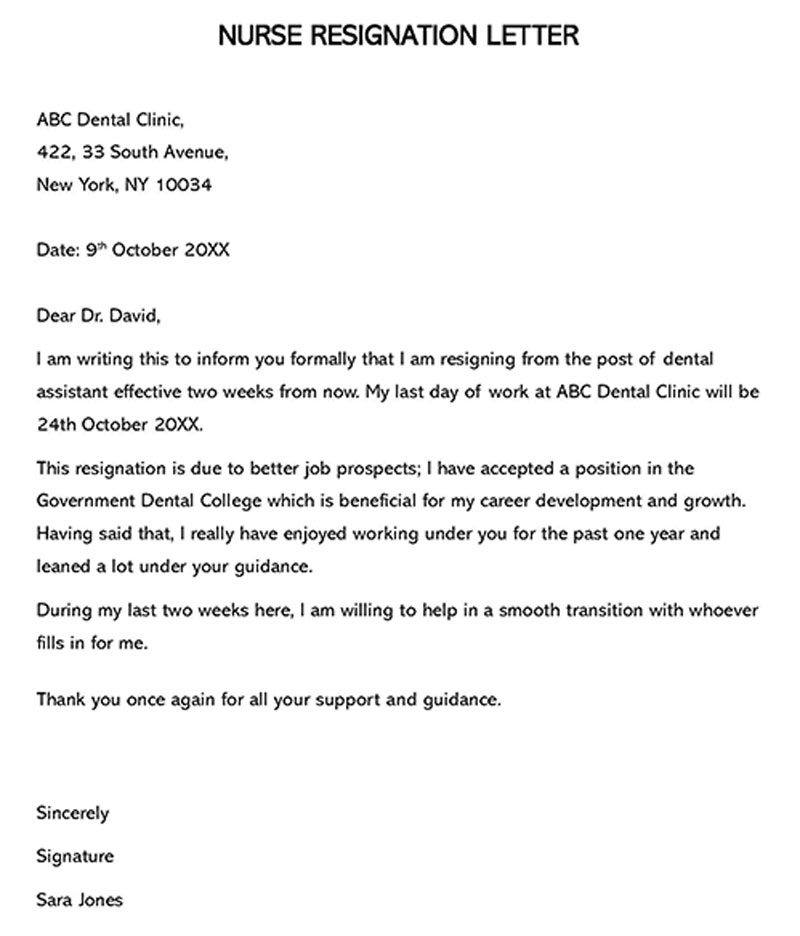
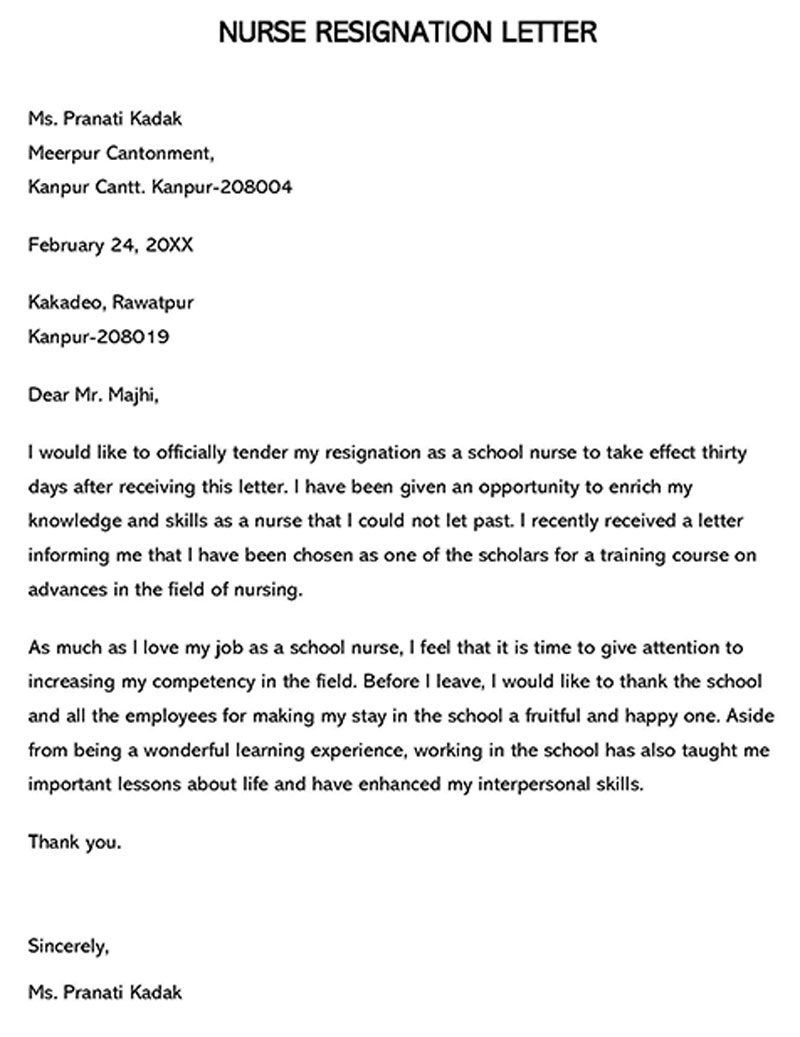
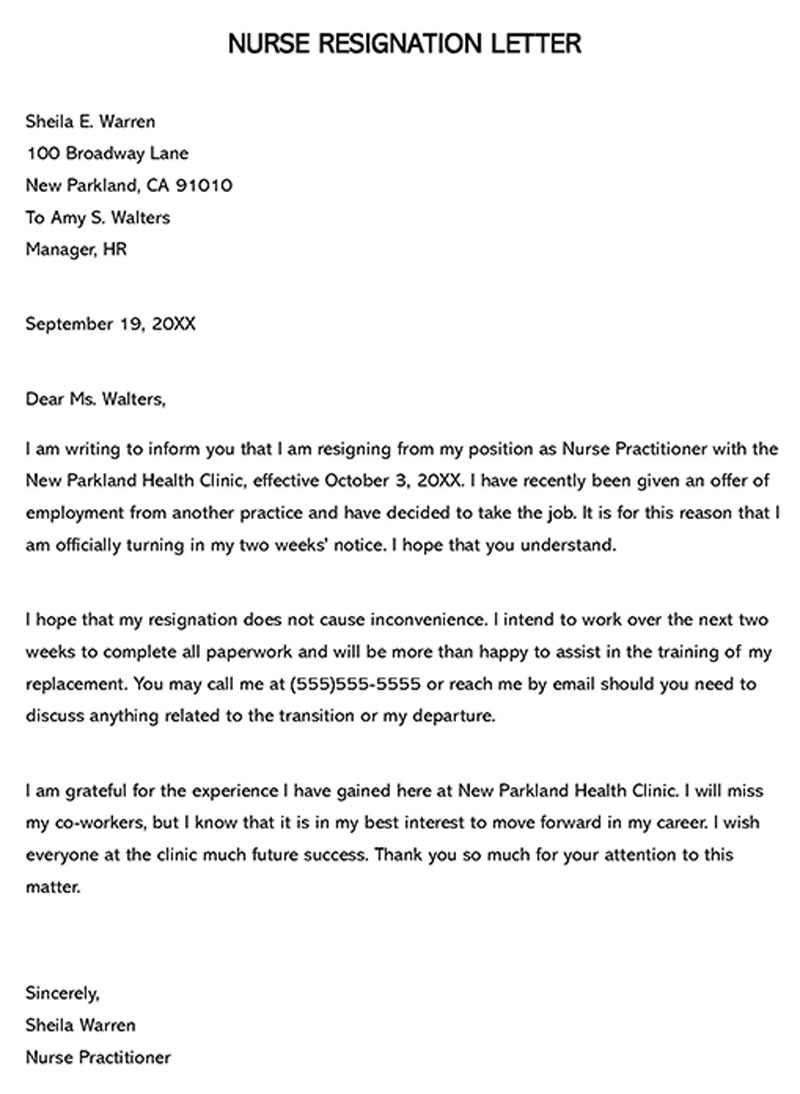
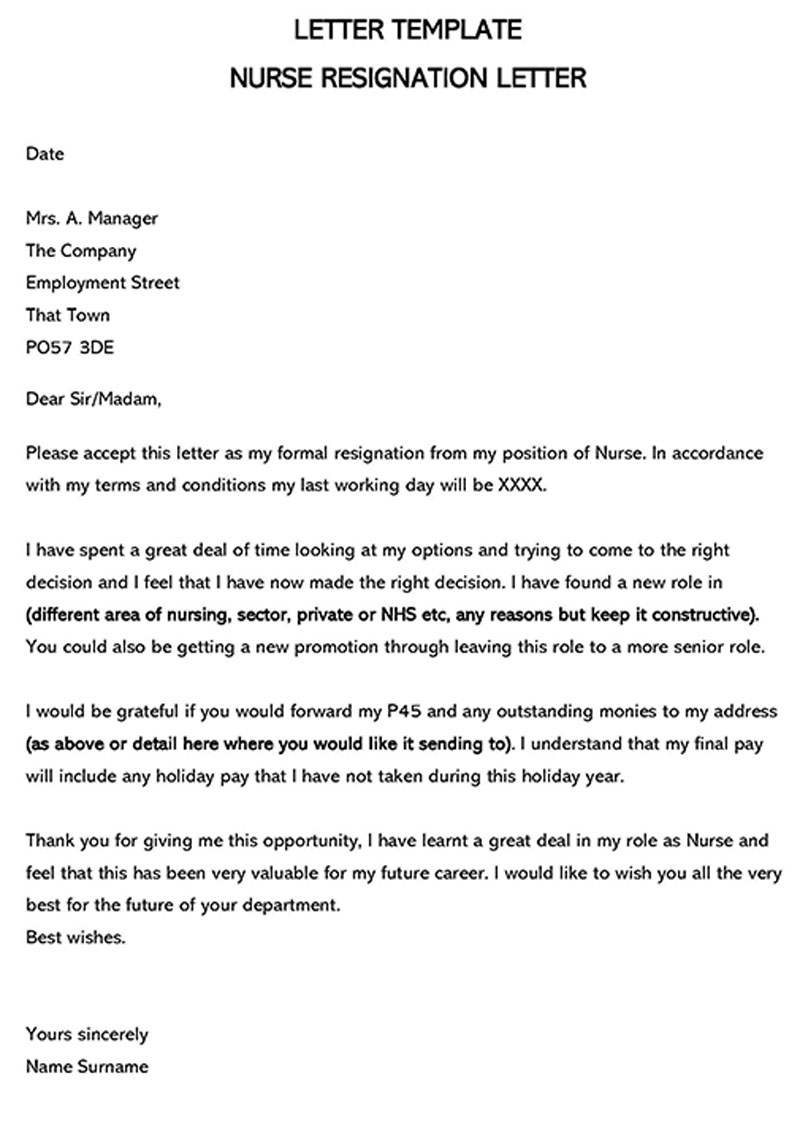
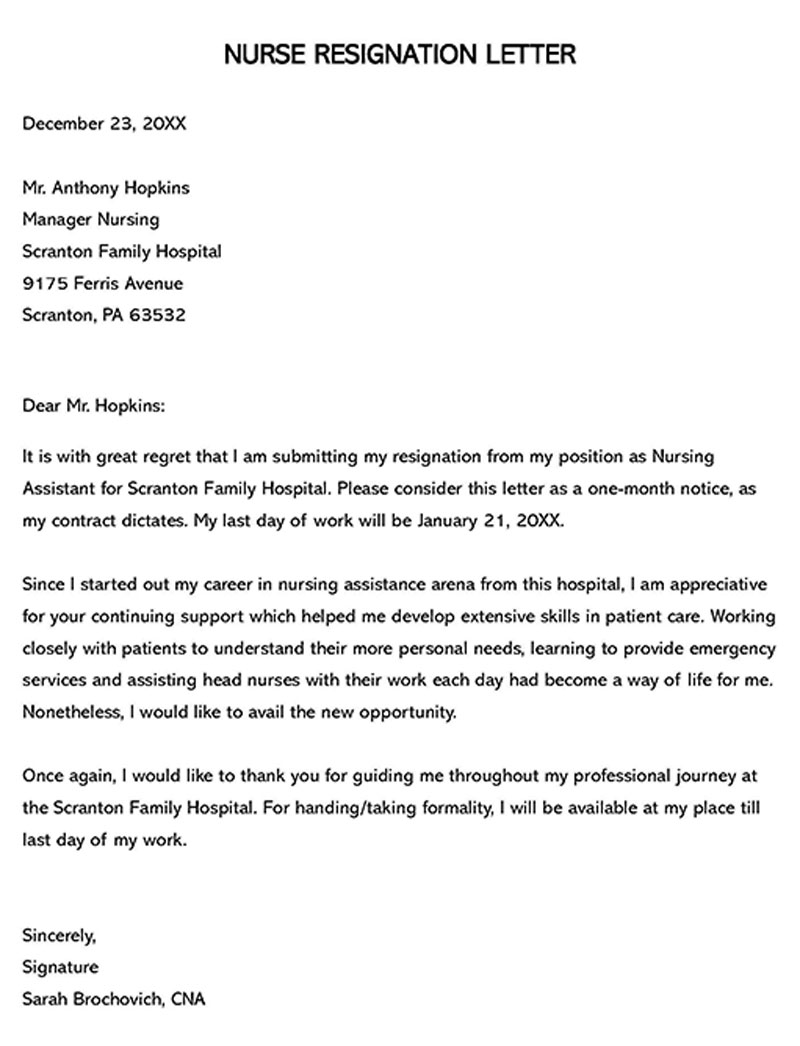
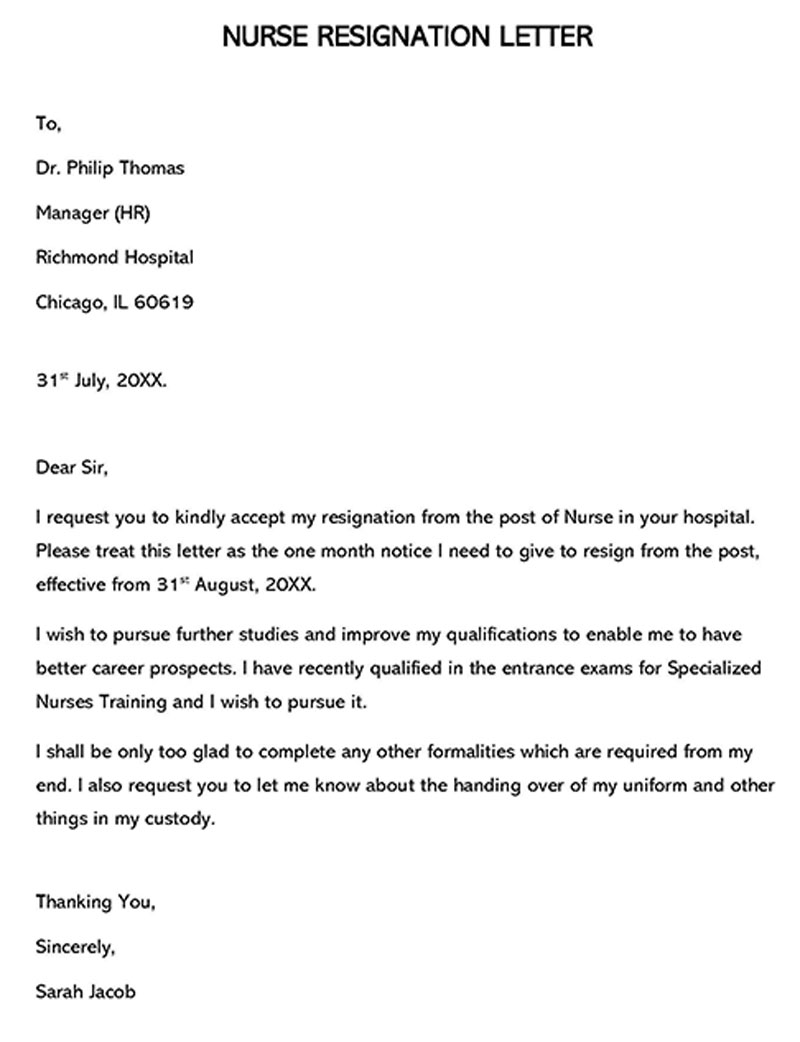
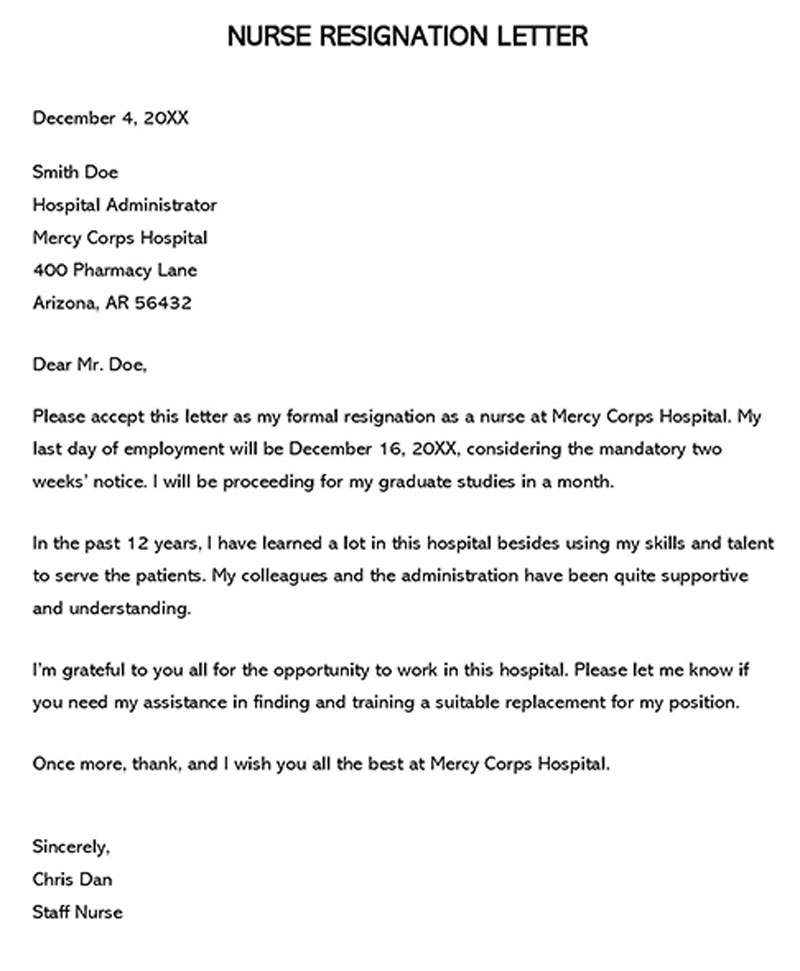
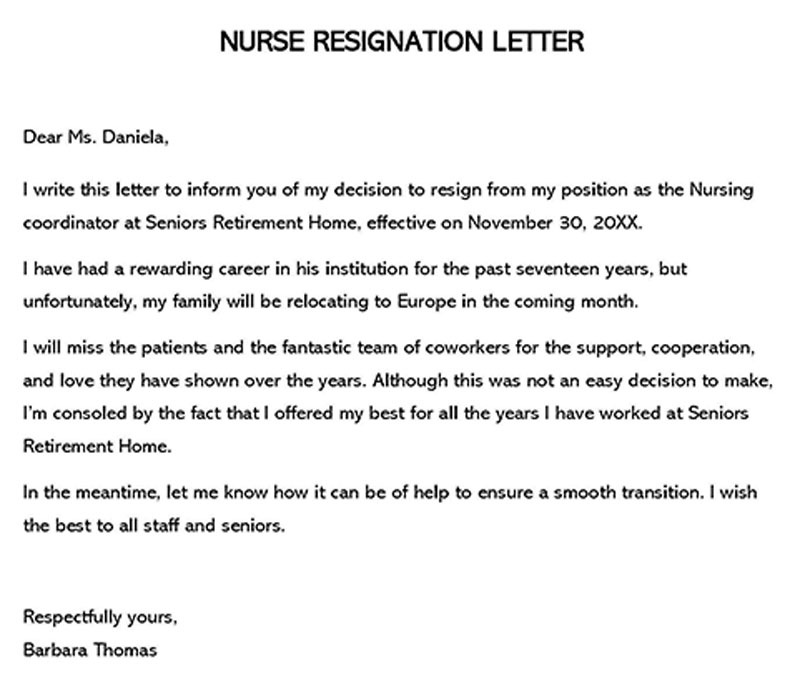
Pre-Resigning Considerations
A well-executed process goes beyond handing in a well-crafted resignation letter. Some of the things you have to consider before preparing it are as follows:
Control your emotions
Sometimes you may resign due to differences or conflicts with management or colleagues. You, therefore, should control your emotions before deciding whether to proceed with resignation as your only option. In some cases, resignation may be a reactive response that can be solved with other alternatives. Nevertheless, you should resort to it if it is the rational thing to do.
Consult/talk with management/employer
It would help to discuss this with your employer before sharing the information with other people. Then, request an in-person meeting with your manager or HR and politely disclose your decision. Also, let them know you will follow up on the meeting with a resignation letter.
Announce the departure date and give notice
Before sending it, you should first decide how much notice you wish or are required to give before the official resignation from your position and, consequently, your last day of work. Ensure you give sufficient notice to allow your employer to find a replacement and give you enough time to train the nurse to ease the delegation of duties and responsibilities. The date of departure has to appear in the letter.
Follow-up with a resignation letter
Once all the specifics of the resignation have been determined, you can now write your resignation. Keep the letter respectful, and thank your employer for their support and guidance. Ensure that your resignation letter is signed to declare that you attest to what you have mentioned in the letter.
Format of the Letter
It is an official document and should thus be formatted accordingly. The resignation should be organized in a business format, like any formal letter.
The following components should appear in the letter:
Formal letterhead
A formal letterhead should be included in the letter. A formal letterhead will outline your identification details and your employer details. In addition, ensure the names and contact details of the sender and recipient are indicated as the date.
Salutation/introduction
A formal salutation should also appear in the letter. A formal salutation can be formatted as follows; “Dear [Mr/Mrs/Ms] [title] [last name]. An introductory paragraph follows the salutation. The first paragraph or introduction, declares your intention to resign and indicates your departure date.
Body of the letter
The body of the letter should then follow the introduction. The body can be two to three paragraphs long. Each paragraph of the letter should discuss a specific aspect of the resignation. Also, each paragraph should be separated with a blank line to ensure the letter appears neat and presentable.
Conclusion
A concise conclusion should be supplied as the final section of the letter. First, a formal conclusion should include an appreciation message and well wishes in your absence. Then, a formal complimentary followed by your signature.
Steps to Write a Letter
When writing, it is crucial to ensure that all the necessary details regarding the resignation are addressed. This may often require adopting a sequence of steps that guide you in creating an all-inclusive letter.
Below is a procedure that can be employed when writing it:
Intent to resign
The letter should start with a statement that declares your intention to resign. The statement sets the direction of the rest of the letter. Your intention to resign should be declared precisely and explicitly, not implied.
Date of resignation/Two weeks-notice
Once you have let your employer or manager know you intend to resign, notify them of the last date you intend to carry out your official duties. This date is referred to as the resignation date, not to be confused with when the letter was written. Try to ensure the date gives the employer at least a two-week notice.
Reasons for leaving
Afterward, it would be best to give a reason for resigning. Again, this information should be mentioned in brief. You are not necessarily required to describe your reason for resigning. However, if you find it essential to mention the reason(s), you can do so at this point.
What you learned in this position
The letter should then discuss any professional or personal ethics you learned in the position. Ensure that the lessons you mention are favorable so that the resignation letter doesn’t sound like you’re criticizing the organization.
Positive aspects/outcomes from the position
Next, you should mention the positive aspects of working as a nurse. For example, you can discuss the organization’s support system, employee-employer relationship, conducive working relationship, friendly staff, etc.
An offer to assist with the transition
It would help to offer your assistance with the transition. Assistance can be offered in diverse ways; some people choose to train their replacement, whereas others will offer to continue with certain obligations and complete pending tasks before departure.
Thanks and appreciation
To ensure you leave your employment without jeopardizing potential references from your employer, you should express your gratitude to the organization for allowing you to work in their organization.
Letter Template
[Your Name]
[Your Address]
[City, State, Zip Code]
[Email Address]
[Phone Number]
[Date]
[Supervisor’s Name]
[Your Position]
[Hospital/Clinic Name]
[Address]
[City, State, Zip Code]
Dear [Supervisor’s Name],
I am writing to formally announce my resignation from my position as a Nurse at [Hospital/Clinic Name], effective [Last Working Day, typically a two-week period]. This decision was not made lightly, but after careful consideration, I have decided to [reason for leaving, e.g., pursue further education, personal reasons, relocation, etc.].
I want to express my sincere gratitude for the opportunities to develop both personally and professionally during my time at [Hospital/Clinic Name]. Working alongside such a dedicated team and serving our patients has been incredibly rewarding. I am proud of the work we have accomplished together and the differences we have made in the lives of many.
During my remaining time, I am fully committed to ensuring a smooth transition. I am willing to assist in the training of my replacement and to complete all pending tasks to the best of my ability. Please let me know how I can further facilitate this process.
Please consider this letter as my official two weeks’ notice of resignation. I look forward to discussing how we can make this transition as seamless as possible. I am hopeful that I will leave [Hospital/Clinic Name] on good terms and with your understanding and support.
Thank you again for the opportunity to work at [Hospital/Clinic Name]. I am looking forward to staying in touch, and I hope to cross paths again in the future.
Warmest regards,
[Your Name]
Letter Sample
Dear Dr. Martin,
I am writing to formally announce my resignation from my position as a Nurse at Healthville General Hospital, effective March 1, 20XX. After much deliberation, I have decided to relocate to New City for family reasons, a decision that has been difficult but necessary for my personal circumstances.
I cannot thank you enough for the opportunities for growth and development I’ve received during my tenure at Healthville General Hospital. The experience of working with such a skilled team and contributing to our patients’ care has been profoundly fulfilling. I am particularly proud of our collaborative efforts during the recent health crisis, where our teamwork and dedication truly made a difference.
I am committed to making my departure as smooth as possible and will do everything in my power to assist in the training of my replacement and finalize my current projects. I hope to discuss how I can help with the transition over the next two weeks, ensuring no disruption in patient care.
Please accept this letter as my official two weeks’ notice of resignation. I am eager to work with you to facilitate a seamless transition and am grateful for your understanding and support during this time.
Thank you again for the invaluable experiences and friendships I’ve gained at Healthville General Hospital. Although I am moving on, I hope to keep in touch, and perhaps our paths will cross again in the future.
Warmest regards,
Emily Johnson
Analysis
This resignation letter is effective due to its clarity, professionalism, and positive tone. The writer concisely states the purpose of the letter, the position they are resigning from, and the effective date, which are critical details for a resignation letter. Mentioning the reason for leaving (relocation for family reasons) personalizes the message and helps the recipient understand the context behind the decision.
The expression of gratitude towards the opportunities provided by the hospital and the acknowledgment of the collaborative efforts during challenging times reflect positively on the writer, emphasizing a sense of teamwork and appreciation for the work environment. This approach maintains a positive relationship with the employer, which is beneficial for future references or interactions.
The commitment to facilitating a smooth transition by assisting in training a replacement and finalizing projects demonstrates a responsible and professional attitude towards the resignation process. It shows consideration for the employer and the team left behind, aiming to minimize the impact of the departure.
Finally, the writer’s openness to keeping in touch and the warm closing remark leaves the door open for future professional interactions, preserving a good network and rapport with the hospital and its staff. Overall, the letter balances the announcement of departure with gratitude and professionalism, making it an effective communication tool during a resignation.
Tips for Writing Professional Letters
A well-written letter is your chance to showcase your professionalism and politeness as you vacate your position at the medical facility.
Below are a few tips you can observe to ensure your resignation effectively communicates what you intend:
Keep it short and simple
An excellent letter should be a notice of resignation to management. This means any information given in the letter should be intentional and relevant to the notice. It would help if you did not go into details or vent about why you are resigning. Instead, let the management know you are resigning, the departure date, a few highlights, and an appreciation message.
Be respectful and kind
Always keep the letter respectful and kind. This means careful use of tone and wording. In addition, you should uphold a high level of professionalism regardless of why you are resigning. This can be accomplished by using appropriate titles.
Format like a business letter
It should consistently be formatted as a business letter. In addition, the letter should have an official format and tone, regardless of the nature of your relationship with your manager or supervisor.
No grammatical or punctuation errors
When writing this letter, write it before the day you want to send it to have enough time to create an error-free letter. Waiting until the last minute to write the letter can result in a document filled with grammatical, spelling, typographical, and other errors. Therefore, always review the letter and make appropriate corrections.
Emailing Your Letter
You do not always get to send a physical resignation letter, even though it is highly recommended. Sometimes you may have to send your notice via email, depending on company policy or circumstances.
The letter should be written in a traditional font with a font size of between 10-12 points. In addition, the letter should be attached to the email in PDF format to facilitate printing for record-keeping. Also, you should use a proper subject line that indicates the letter’s purpose. This can be done by incorporating “resignation letter” in the subject line.
The letter should also have an appropriate salutation and body, and a professional closing should be included at the end. Also, provide your contact information after your name.
Final Remarks
A nurse resignation letter is arguably the last positive addition to your file in company records. Hence, it would be best if you aimed to write it in the best way possible. With the guidance of this article, you are set up to craft a professional resignation that will leave an excellent and lasting impression on your employer.
Resigning from your job in any profession is usually a scary step. However, it may be inevitable in some situations; therefore, if you have made the brave decision to resign as a nurse from your organization, well done! However, do not rush into writing the letter without clearly understanding what you should include and how you organize the letter.
Going through a few letter samples, like the one provided above, can help with this. Lastly, ensure to follow company policies and contractual terms when resigning.








